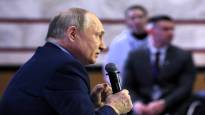The stories about Putin’s death can be dismissed as entertainment, but in the North Caucasus, it was far from fun when social media rumors incited an anti-Jewish pogrom, writes Russia correspondent Heikki Heiskanen.
Heikki Heiskanen
MOSCOW On Thursday, October 26, the General SVR Telegram channel announced the following: The President of Russia Vladimir Putin died this evening at his apartment in Valdai. At 20:42 the doctors stopped resuscitation efforts and declared him dead.
The channel has a convenient explanation for the fact that Putin has appeared in public even after that: it’s a double being.
The British tabloids in particular seem to pick up on rumors about Putin’s illness or even death.
It’s hard to see any meaning other than entertainment value or the joy of wishful thinking in statements that are impossible to verify in any way.
In the background of the General SVR channel are sometimes claimed to be former or current employees of the Russian security services, but it is difficult to say anything for sure about the anonymous channel.
The channel has been suspected of being linked to a political researcher known as a lover of conspiracy theories To Valeri Solovei. Solovei himself has denied being behind the channel.
Over the years, Solovei has said on several occasions, even under his own name, that Putin is seriously ill and will die soon. There is a certain demand for such news in the Western media.
It’s hard to believe in an all-knowing Telegram channel for one simple reason: If information about Putin’s inner circle was really leaked, the security services would surely have blocked the leak quickly and without hesitation. In the conditions of Putin’s current isolation, the circle of possible suspects would inevitably be narrow.
A representative of Ukrainian military intelligence Andrii Yusov guessed for a Ukrainian For Radio NVthat the Russian rulers themselves spread rumor of Putin’s death to test the reactions of Russian society.
It is difficult to say whether there is even such a planned activity behind the rumours.
It is interesting that the General SVR channel has been allowed to operate despite the outrageous stories it has been spreading.
Questions also arise about the unrest that rocked Dagestan in the North Caucasus last weekend. A Telegram channel called Utro Dagestan has been seen as their instigator,
Only when the enraged mob rushed Utro Dagestan was shut down by the Telegram messaging service at the Makhachkala airport to search for Jewish refugees from the plane arriving from Tel Aviv.
The channel had spread rumors about Jewish refugees and incited Dagestanis to accept them.
Utro Dagestan is also a sufficiently mysterious case. The channel has previously been connected to a former Russian MP Ilya Ponomarjovwho defected to Ukraine in 2016.
Former editor-in-chief of Ponomarjov’s media resources Fyodor Klimenko said For the Meduza news sitethat the Utro Dagestan channel is now run by a businessman and social influencer born in Dagestan Abakar Abakarov.
In 2016, Abakarov left for Ukraine. He is said to have founded an Islamic school in Odessa in cooperation with Hizb ut-Tahrir, an organization declared a terrorist organization and banned in Russia. After the Russian invasion in February 2022, Abakarov moved to Istanbul.
It’s hard to know what the truth is in the end. In any case, it would be important for the Russian authorities to show that the culprit for the unrest in the North Caucasus lies outside the country.
President Putin said on Friday that anti-Jewish pogroms in Russia were organized by “overseas actors” – that is, the United States.
In the case of the North Caucasus, the question is why such provocation succeeded so easily, why vague and implausible rumors about Israeli refugees seeking Dagestan found an echo base.
It is a difficult question for Russia’s rulers to the extent that answering it would also require looking in the mirror.
Russia’s secretive political culture and a personal-driven authoritarian political system create a fertile ground for conspiracy theories to spread.
When the difference between the words of those in power and the reality becomes large enough, it is easy for citizens to believe, for example, in the intricate conspiracies of the Byzantines.
From the speeches of President Putin and other Russian politicians, you can hear that even the people in power themselves swear by conspiracies in Russia.
Conspiracy theories are one way to deal with a world that has become incomprehensible. Even in western countries that consider themselves to be enlightened, they have found a catchment area for them.
The scary thought is that there is no big plan, but both the rulers and the citizens alike are groping in the dark, in the midst of growing uncertainty.
Of course, the General SVR channel continues its big story about the death of the Kremlin host.
On Friday, the channel announced that the power circles are now thinking about the work pace and frequency of appearances of Putin’s double being.
